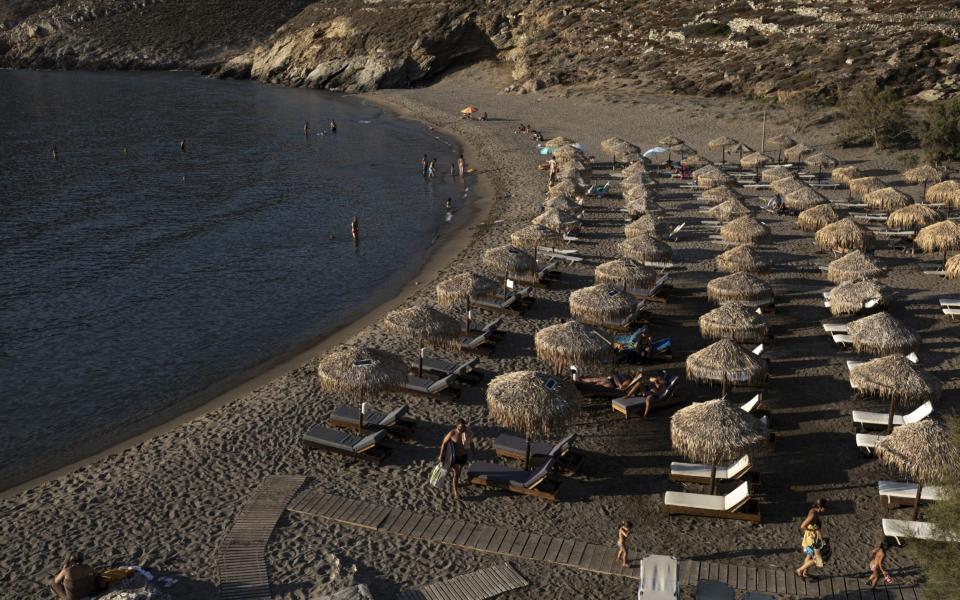British holidaymakers gamble on Greece as it overtakes Spain for first time despite spike in cases

British tourists are gambling on Greece for their holidays despite a spike in cases as the country has overtaken Spain in popularity for the first time.
Data from Skyscanner, the flight bookings website, showed that when the Government changed its travel advice requiring people returning to England from Spain to quarantine for two weeks, travellers began to look elsewhere.
While Barcelona, Ibiza and Malaga were consistently in the top 10 most sought after routes on the site throughout 2019, in the week after quarantine measures were announced they were replaced by Greek destinations including Crete, Corfu and Santorini.
This is despite Greece recording 121 new cases on Tuesday, its highest number since April 22.

Meanwhile, uncertainty has continued over whether France could be the next country to be added to the UK’s quarantine list following a significant rise in both the country's rate and number of infections.
Friday (August 8) saw more than 2,200 people test positive for coronavirus in France, a new daily record since its quarantine measures were lifted in June.
Appearing on Sky News on Saturday (August 9), the Chancellor Rishi Sunak said that there is “always the risk of disruption to travel plans”, and urged people to “bear that in mind” when planning their summer holidays abroad.
Schools minister Nick Gibb echoed Mr Sunak's comments, and said that the Government will not hesitate to change quarantine policy with regards to countries that are deemed "sufficiently dangerous" at any particular time.
Meanwhile, Portugal could soon be added to the FCO’s ‘green list’, which would mean that Britons would be able to travel there with no requirement to quarantine on their return, although the timeframe for this is currently thought to be ‘weeks, rather than days’.
Ministers are understood to be happy with the low infection numbers in Portugal, and continue to monitor the rates to ensure that this trend continues. At the peak of its epidemic, daily cases in Portugal - which has a population of 10.2 million - regularly surpassed 500, but between August 3 and August 7 the country averaged 177 daily new infections.
Earlier this week, Portugal's minister of foreign affairs Augusto Santos Silva told news website Observador that authorities are preparing “to present information on the evolution of the epidemiological situation exactly according to the parameters and indicators that the United Kingdom has told us it is using”.
Jon Thorne, an expert at Skyscanner, said that whenever the Government changed its travel advice for different countries it had a direct effect on consumer behaviour.
He said: “The significant drop in searches and bookings to Spain from the UK on Skyscanner last week was a direct reaction to the current restrictions in the UK and uncertainty around travel to and from holiday favourites there.
“Over the last few months, we have seen a direct correlation in search and booking data following changes in guidance.”
While Skyscanner could not say definitively whether Greece had ever proved a more popular destination than Spain with its users it said this had been the clear trend for the past five years. There was still demand for holidays to Spain later in the year, the firm said.
Although the 121 new cases detected in Greece on Tuesday was the highest since April, it is still far lower than many other countries in Europe.

A spokesman for the Greek Ministry of Tourism said: "We look forward to welcoming our British guests in Greece, the land where smiles go as far as the eyes can see. Putting always safety first."
The British Government has said it will not hesitate to change its travel advice if the health situation changes around the world.
A spokesman for the Foreign and Commonwealth Office said it is monitoring the international situation “very closely” and keeping its travel advice under review. People returning from Greece do not currently need to self-isolate.
Martyn James, a consumer rights expert at Resolver, warned that anyone booking a holiday overseas at the moment was taking a risk.
He added: “Any holiday outside of this country booked at the moment carries a risk that you won’t be able to go or that you will have to quarantine on the way back. People going into it should be aware by now.
“I am advising people to get it in writing that you will be able to move your hotel booking before you go. There is a chance that you won’t get any of your money back.”
Emma Coulthurst, of holiday comparison site Travelsupermarket.com, said there were deals to be had for those looking for a holiday this summer.
Since the FCO changed its advice on travel to Spain, the site has seen searches for holidays to the country fall by 80 per cent but this demand has shifted elsewhere.
She said: “Those prospective holidaymakers, who are looking to holiday overseas, are turning their attention to Greece, followed by Turkey, Italy, Malta and Croatia.”
Ms Coulthurst added: “My advice would be that if you’re looking for a holiday, packages give you that gold plated protection. If the FCO advice was to change to non-essential travel, then you are entitled to your money back for the package within 14 days.”
She said that the relatively low levels of Covid-19 in Greece, Italy and Turkey were part of the reason they were proving so popular.


